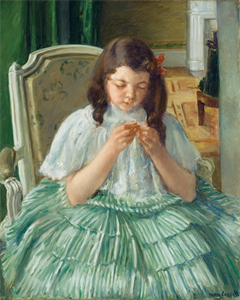
Edward Troye
American, born Switzerland, 1808–1874
The two boys in this painting are the eldest sons of William A. Dawson, a cotton factor (or sales agent) who lived near Mobile, one of the busiest ports on the Gulf of Mexico engaged in trans-Atlantic trade in the early 19th century. According to the title, the boys are shown on the grounds of Dawson's 1840 Georgian-style home, Carolina Hall, which sat on about 100 acres of woodlands west of Mobile. As a genre, this work can be classified as a “conversation piece,” that is, a composition type made popular in England in the 18th century which shows people, often families or groups of friends, portrayed informally in a garden or a domestic interior.
The artist trained in London as a painter of animal subjects, and came to the U.S. in 1831. He taught drawing and French at Spring Hill College between 1849 and 1855, but is best-known for his hundreds of paintings of prize-winning American thoroughbred racehorses. This work is a very rare example of a painting made in Alabama in the 19th century by a trained artist, representing known sitters and landscape in an identifiable location.
American, born Switzerland, 1808–1874
The Dawson Brothers: William A. Jr. on Jack, John Holding the Bird Dog Nimrod and the Coursing Dog Silky at Carolina Hall, Mobile, Alabama
1850
Object Type:
Painting
Creation Place:
North America, American, Kentucky
Dimensions:
27 x 36 1/8 in. (69 x 92 cm)
Medium and Support:
Oil on canvas
Accession Number:
2022.0004
Credit Line:
Gift of the Ida Belle Young Art Acquisition Fund
The two boys in this painting are the eldest sons of William A. Dawson, a cotton factor (or sales agent) who lived near Mobile, one of the busiest ports on the Gulf of Mexico engaged in trans-Atlantic trade in the early 19th century. According to the title, the boys are shown on the grounds of Dawson's 1840 Georgian-style home, Carolina Hall, which sat on about 100 acres of woodlands west of Mobile. As a genre, this work can be classified as a “conversation piece,” that is, a composition type made popular in England in the 18th century which shows people, often families or groups of friends, portrayed informally in a garden or a domestic interior.
The artist trained in London as a painter of animal subjects, and came to the U.S. in 1831. He taught drawing and French at Spring Hill College between 1849 and 1855, but is best-known for his hundreds of paintings of prize-winning American thoroughbred racehorses. This work is a very rare example of a painting made in Alabama in the 19th century by a trained artist, representing known sitters and landscape in an identifiable location.
Portfolio List
Click a portfolio name to view all the objects in that portfolio
This object is a member of the following portfolios:
Your current search criteria is: All Object records.

 by Artist (743)
by Artist (743)
